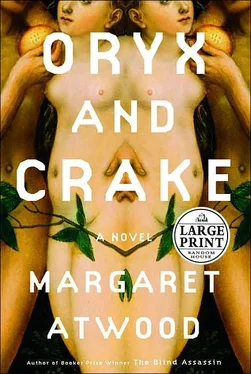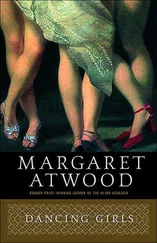“Oryx,” he says. “I know you’re there.” He repeats the name. It’s not even her real name, which he’d never known anyway; it’s only a word. It’s a mantra.
Sometimes he can conjure her up. At first she’s pale and shadowy, but if he can say her name over and over, then maybe she’ll glide into his body and be present with him in his flesh, and his hand on himself will become her hand. But she’s always been evasive, you can never pin her down. Tonight she fails to materialize and he is left alone, whimpering ridiculously, jerking off all by himself in the dark.
Snowman wakes up suddenly. Has someone touched him? But there’s nobody there, nothing.
It’s totally dark, no stars. Clouds must have come in.
He turns over, pulls his sheet around him. He’s shivering: it’s the night breeze. Most likely he’s still drunk; sometimes it’s hard to tell. He stares up into the darkness, wondering how soon it will be morning, hoping he’ll be able to go back to sleep.
There’s an owl hooting somewhere. That fierce vibration, up close and far away at once, like the lowest note on a Peruvian flute. Maybe it’s hunting. Hunting what?
Now he can feel Oryx floating towards him through the air, as if on soft feathery wings. She’s landing now, settling; she’s very close to him, stretched out on her side just a skin’s distance away. Miraculously she can fit onto the platform beside him, although it isn’t a large platform. If he had a candle or a flashlight he’d be able to see her, the slender outline of her, a pale glow against the darkness. If he put out his hand he could touch her; but that would make her vanish.
“It wasn’t the sex,” he says to her. She doesn’t answer, but he can feel her disbelief. He’s making her sad because he’s taking away some of her knowledge, her power. “It wasn’t just the sex.” A dark smile from her: that’s better. “You know I love you. You’re the only one.” She isn’t the first woman he’s ever said that to. He shouldn’t have used it up so much earlier in his life, he shouldn’t have treated it like a tool, a wedge, a key to open women. By the time he got around to meaning it, the words had sounded fraudulent to him and he’d been ashamed to pronounce them. “No, really,” he says to Oryx.
No answer, no response. She was never very forthcoming at the best of times.
“Tell me just one thing,” he’d say, back when he was still Jimmy.
“Ask me a question,” she’d reply.
So he would ask, and then she might say, “I don’t know. I’ve forgotten.” Or, “I don’t want to tell you that.” Or, “Jimmy, you are so bad, it’s not your business.” Once she’d said, “You have a lot of pictures in your head, Jimmy. Where did you get them? Why do you think they are pictures of me?”
He thought he understood her vagueness, her evasiveness. “It’s all right,” he’d told her, stroking her hair. “None of it was your fault.”
“None of what, Jimmy?”
How long had it taken him to piece her together from the slivers of her he’d gathered and hoarded so carefully? There was Crake’s story about her, and Jimmy’s story about her as well, a more romantic version; and then there was her own story about herself, which was different from both, and not very romantic at all. Snowman riffles through these three stories in his head. There must once have been other versions of her: her mother’s story, the story of the man who’d bought her, the story of the man who’d bought her after that, and the third man’s story—the worst man of them all, the one in San Francisco, a pious bullshit artist; but Jimmy had never heard those.
Oryx was so delicate. Filigree, he would think, picturing her bones inside her small body. She had a triangular face—big eyes, a small jaw—a Hymenoptera face, a mantid face, the face of a Siamese cat. Skin of the palest yellow, smooth and translucent, like old, expensive porcelain. Looking at her, you knew that a woman of such beauty, slightness, and one-time poverty must have led a difficult life, but that this life would not have consisted in scrubbing floors.
“Did you ever scrub floors?” Jimmy asked her once.
“Floors?” She thought a minute. “We didn’t have floors. When I got as far as the floors, it wasn’t me scrubbing them.” One thing about that early time, she said, the time without floors: the pounded-earth surfaces were swept clean every day. They were used for sitting on while eating, and for sleeping on, so that was important. Nobody wanted to get old food on themselves. Nobody wanted fleas.
When Jimmy was seven or eight or nine, Oryx was born. Where, exactly? Hard to tell. Some distant, foreign place.
It was a village though, said Oryx. A village with trees all around and fields nearby, or possibly rice paddies. The huts had thatch of some kind on the roofs—palm fronds?—although the best huts had roofs of tin. A village in Indonesia, or else Myanmar? Not those, said Oryx, though she couldn’t be sure. It wasn’t India though. Vietnam? Jimmy guessed. Cambodia? Oryx looked down at her hands, examining her nails. It didn’t matter.
She couldn’t remember the language she’d spoken as a child. She’d been too young to retain it, that earliest language: the words had all been scoured out of her head. But it wasn’t the same as the language of the city to which she’d first been taken, or not the same dialect, because she’d had to learn a different way of speaking. She did remember that: the clumsiness of the words in her mouth, the feeling of being struck dumb.
This village was a place where everyone was poor and there were many children, said Oryx. She herself was quite little when she was sold. Her mother had a number of children, among them two older sons who would soon be able to work in the fields, which was a good thing because the father was sick. He coughed and coughed; this coughing punctuated her earliest memories.
Something wrong with the lungs, Jimmy had guessed. Of course they all probably smoked like maniacs when they could get the cigarettes: smoking dulled the edge. (He’d congratulated himself on this insight.) The villagers set the father’s illness down to bad water, bad fate, bad spirits. Illness had an element of shame to it; no one wanted to be contaminated by the illness of another. So the father of Oryx was pitied, but also blamed and shunned. His wife tended him with silent resentment.
Bells were rung, however. Prayers were said. Small images were burned in the fire. But all of this was useless, because the father died. Everyone in the village knew what would happen next, because if there was no man to work in the fields or in the rice paddies, then the raw materials of life had to come from somewhere else.
Oryx had been a younger child, often pushed to the side, but suddenly she was made much of and given better food than usual, and a special blue jacket, because the other village women were helping out and they wanted her to look pretty and healthy. Children who were ugly or deformed, or who were not bright or couldn’t talk very well—such children went for less, or might not be sold at all. The village women might need to sell their own children one day, and if they helped out they would be able to count on such help in return.
In the village it was not called “selling,” this transaction. The talk about it implied apprenticeship. The children were being trained to earn their living in the wide world: this was the gloss put on it. Besides, if they stayed where they were, what was there for them to do? Especially the girls, said Oryx. They would only get married and make more children, who would then have to be sold in their turn. Sold, or thrown into the river, to float away to the sea; because there was only so much food to go around.
Читать дальше












